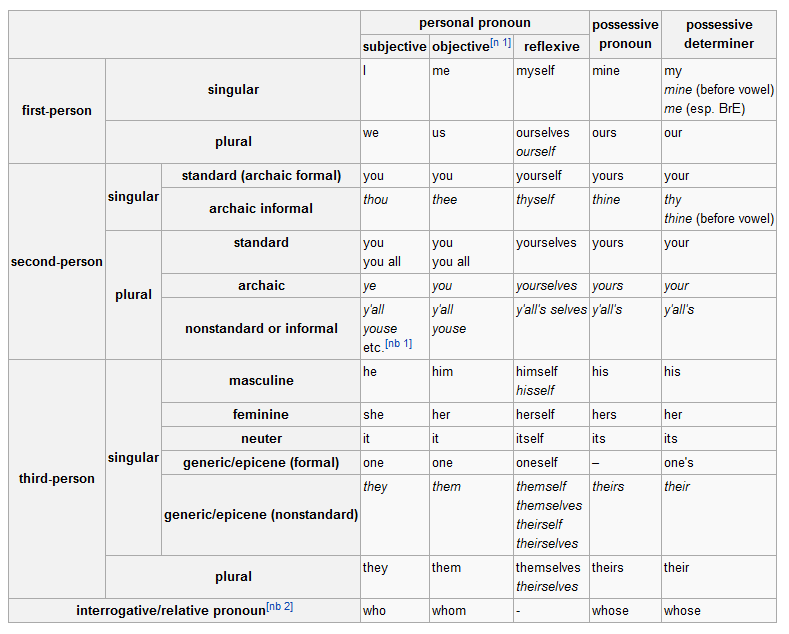Pronoun English grammar lesson - how to use pronouns
Learning how to use pronouns
During this grammar lesson you will learn what pronouns are and how to use them in your own sentences.
What are pronouns?
Pronouns are words like I, it, which, who, that, his, herself. They are used 'in place of' a noun or a noun phrase. To avoid repetition, we use a pronoun for the second and subsequent mentions of the same person or thing:
When I arrived at their house, the big dog, which was called Rover, was barking loudly because it was lonely.
I saw the dog, I think it was chewing your shoe.
A pronoun can be used wherever a noun or a noun phrase can be used in a sentence:
As the subject of a verb:
The dog was barking. It was barking.
As the object of a verb:
I heard the fire alarm. Did you hear it?
As the object of a preposition:
I was thinking about a quick snack. I was thinking about that, too.
There are several different kinds of pronoun, with different functions:
- Personal pronouns
- Relative pronouns
- Interrogative pronouns
- Possessive and demonstrative pronouns
- Reflexive and reciprocal pronouns
- Personal pronouns
I, me, you, he, her, them are called personal pronouns, because they cover the full range of grammatical persons:
the first person (I, we)
the second person (you)
the third person (he her them).
Personal pronouns are almost the only place in English grammar where 'case' is relevant.
In English, only the personal pronouns have different forms or cases which show whether they are subjects or objects:
1st singular 2nd 3rd singular 1st plural 3rd plural
subject I you she, he, it we they
object me you her, him, it us them

How to use personal pronoun cases as a test for subjects and objects.
Relative pronouns
"When I arrived at their house the big dog, which was called Rover, was barking loudly because it was lonely."
In our example sentence the pronoun which refers back to the noun phrase the big dog.
The main relative pronouns are: who, whom, whose, which and that.
Their function is to link a relative clause to a preceding noun:
The man who had fixed the leak had left his spanner.
I enjoyed the film about scuba diving that we saw.
The boy who I saw earlier whose key has been lost ...
Interrogative pronouns
who, whom, whose, which, what, whoever, whichever, whatever
Interrogative pronouns are used in main clauses, to form a question:
Who did it?
What did he say?
Whose pizza is this?
They can also be used to introduce a subordinate clause:
I wonder who did it?
I asked him what he said.
I'm trying to find out whose pizza this is.
Possessive and demonstrative pronouns
Possessive pronouns match the personal pronouns.
Their function is like that of the possessive determiners.
Personal pronouns:
Me you her him it we you they
Possessive pronouns:
mine yours hers his its ours yours theirs
Possessive determiners
my your her his its our your their
Possessive determiners introduce a noun or a noun phrase.
Possessive pronouns stand instead of the noun or noun phrase.
Demonstrative pronouns, like possessive pronouns, are very similar to determiners, and like demonstrative determiners, they have distinct singular and plural forms:
this - these that - those
I like this [determiner] book more than that [pronoun]
I like these books more than those.
Reflexive and Reciprocal Pronouns
Reflexive pronouns match the personal pronouns. They combine a personal or possessive pronoun with the morpheme self (or selves):
myself, yourself, herself, himself, itself, ourselves, yourselves, themselves
Their special function is to refer back to a noun phrase earlier in the same clause. For example:
The children dressed themselves.
In this case the personal pronoun them would not do, as it would refer to people other than the children:
The children dressed them.
Reciprocal pronouns are the word groups each other and one another.
They also refer back to a noun phrase earlier in the same clause, but in a more complex way.
The children dressed each other.
The brothers used to fight with one another.
How to use personal pronoun cases as a test of whether a word is subject or object of a verb.
For example, which word is the subject of this sentence?
Who is that boy?
Word order doesn't help, because of the special rules for questions, so replace that boy by a pronoun ...
Correct Who is he? (NOT Who is him?)
In this case it is clear that he is the subject, so that boy is the subject of the first sentence.
Self-assessment on pronouns
Find the pronouns in the sentence below and classify them as:
personal
possessive
demonstrative
relative
interrogative
reflexive
reciprocal
As usual, some non-pronouns are underlined as decoys.
An actor's a guy who, if you ain't talking about him, ain't listening. (Marlon Brando)
Now decide who or what each pronoun refers to (i.e. names).
An actor's a guy who, if you ain't talking about him, ain't listening.
Easy pace Learning online dictionary and how to use dictionaries
Click on the following link for the Online English dictionary - English lesson
